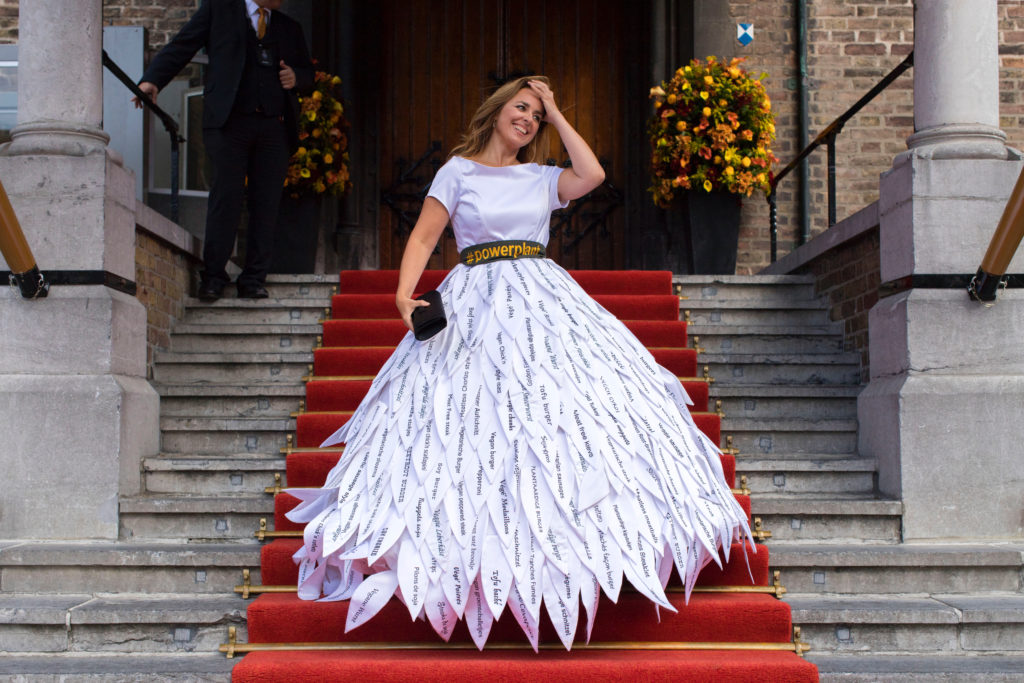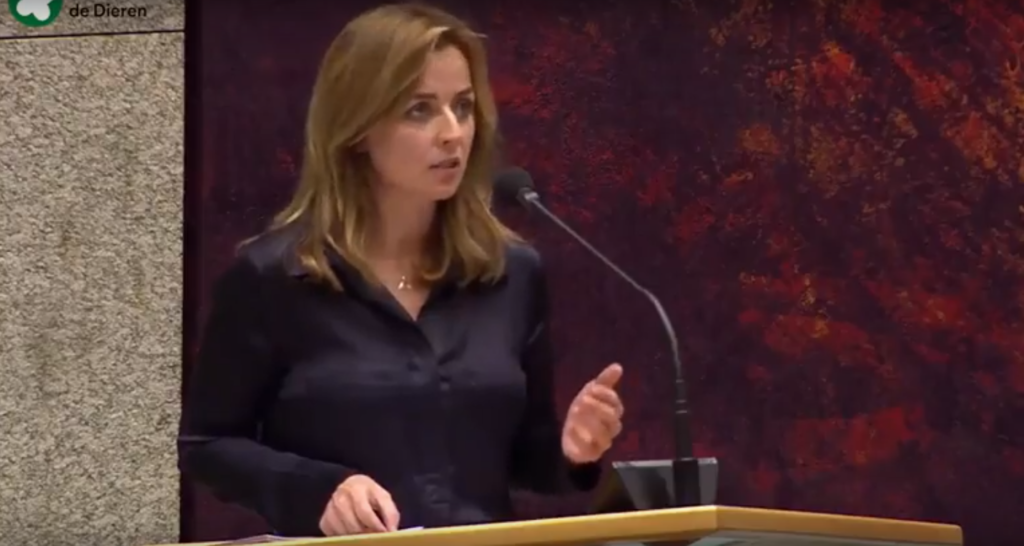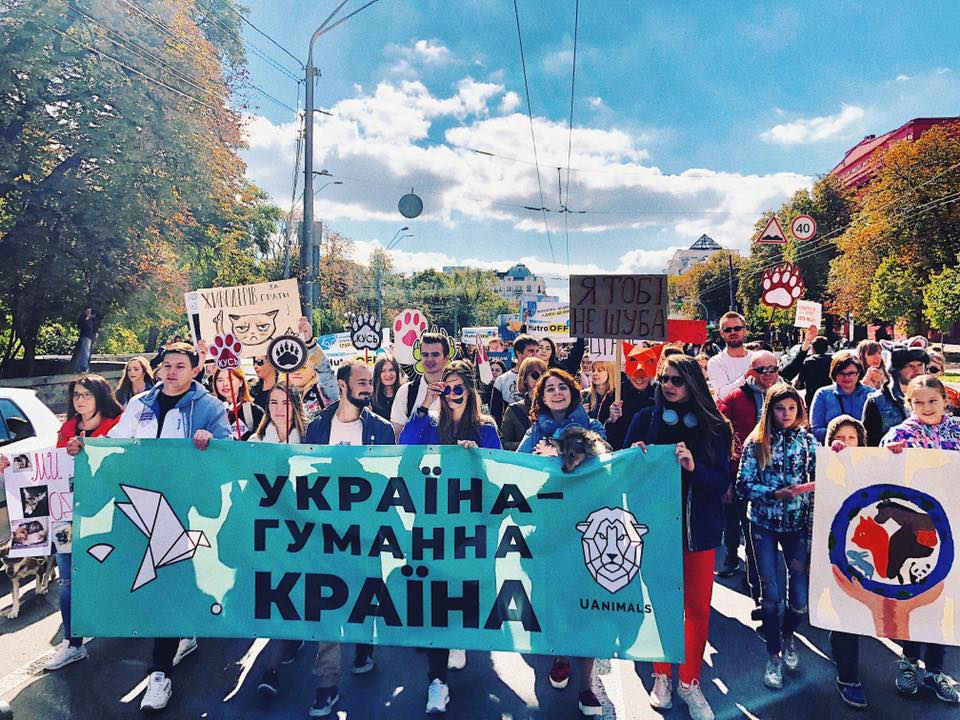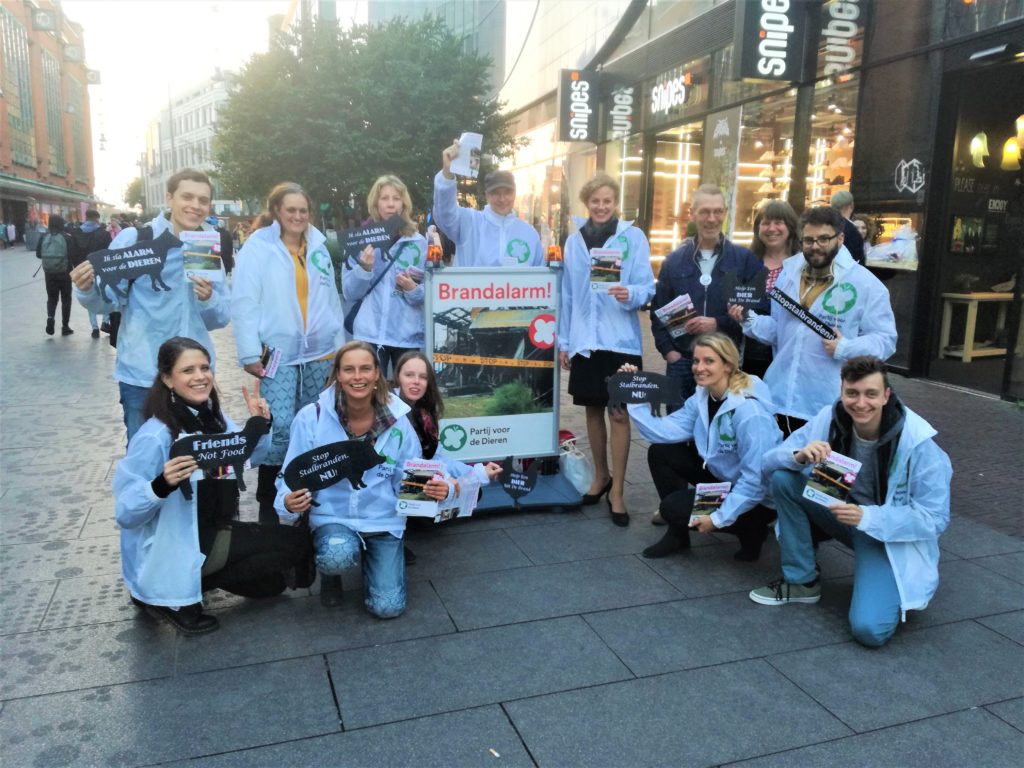Worldlog Marianne Thieme 9 de octubre de 2018
This year was the tenth time in a row we used Prinsjesdag, the most important political event in the Netherlands, to make a political statement. On Prinsjesdag, which is held every year on the third Tuesday of September, the Dutch government presents its plans for the upcoming parliamentary year. It’s customary for participants to dress in suits and fancy dresses on this day, but we want our outfits to also carry an important message.

Marianne in her ‘Vegetarian Meat Dress’ on Prinsjesdag. The dress was designed by Yasmina Ajbilou, who focuses on zero waste fashion.
I wore a dress carrying all imaginable names of vegan and vegetarian meat products currently on the market in Europe – now that I was still allowed to. Worldwide, lobbyists for the meat industry are looking for ways to remove plant-based meat substitutes from the market or make the names of the products illegal. The last convulsions of the meat industry, which clearly feels the market of cruelty-free products breathing down its neck.
The waistband of the dress carries the name of our new documentary, Powerplant. And I can hereby tell you that filming has been completed! The documentary is about the transition to a plant-based and animal-friendly society and will be released at the beginning of 2019. Around the same time, my new book on idealistic politics will be published. I cannot wait to share all this with you!
After Prinsjesdag, the state budget was discussed in the Dutch Lower House. The government’s explanatory notes on the budget, mainly consisting of self-satisfied political propaganda, proved a missed opportunity. The government congratulated itself on irrelevant figures while passing down the truly important matters, such as a strong and honest environmental policy, to other parties. Why not use the tax reform to give carbon emission its real price? Why not use the VAT increase to make sustainable consumption cheaper and non-sustainable consumption more expensive? Instead of having large companies pay to make the Netherlands sustainable, it is now mainly the citizens that are forced to cover the costs.

Our government has passed down the bill to our children and grandchildren. It has made sustainability the responsibility of companies and social organisations, and it has shied away from legal sanctions. It has been three years since Paris, and we are still making our decisions together with companies, gradually losing sight of our goals. Allowing large companies to take part in the decision-making on laws and regulations that might well increase their costs is never going to work; just as you would not allow an offender to decide on the severity of their own punishment. The same goes for agricultural policies.
Agriculture, specifically livestock farming, is facing major problems: agricultural toxins, ammonia, particular matter, soil contamination, animal suffering, food scandals. More and more experts are saying we will not achieve our climate targets unless we radically reduce livestock numbers, which inevitably means a reduction of the consumption of animal products. And the longer we wait, the more difficult and more expensive it will be for farmers to make the transition. But what does the government do? It continues to seek its salvation in so-called innovation, allowing every opportunity for further intensification and expansion. The subject of reducing livestock numbers is carefully avoided. Narrow economic interests weigh more heavily than human and animal welfare.


Pictures of animal rights protests in Turkey and Ukraine
It is so good to see that, despite the meat industry lobbyists, the animal rights movement is growing on a global scale. For example, a march for animals was organised by Ukrainian animal rights organisation UAnimals in 20 different Ukrainian cities. It was a huge success: in the capital Kiev alone, more than 6,000 people joined the march. On Buyukada, the largest island of Turkey, a protest was organised against animal suffering and the tourist horse-drawn carriages. Last Sunday, many people participated in a Vegan March in Istanbul in order to raise awareness about the great injustice we inflict on animals.
Our sister parties are also very successful. Thanks to our Spanish sister party PACMA, 100,000 people in Madrid took to the streets to demonstrate against the cruel practice of bullfighting. Last week, our Portuguese sister party PAN ensured that the tax exemption for bullfighters will most likely be abolished. As of next year, bullfighters will have to pay taxes just like any other citizen. An important step towards a ban on bullfighting in Portugal.

On World Animal Day, the Party for the Animals draws attention to the farm fires killing hundreds of thousands of animals every year
Last week it was World Animal Day. In several cities in the Netherlands, the Party for the Animals drew attention to the hundreds of thousands of animals burnt alive each year in farm fires. The reason that this is still happening in the Netherlands is purely a political one: a majority of the Lower House systematically votes against stricter fire safety regulations. At the moment, toilet paper is better protected from fire than animals. Unbelievable.
The future is plant-based, and this vegan woman of 96 knows it. An inspiration to us all.
Kind regards,
Marianne
Por décima vez consecutiva, hemos aprovechado la tradición política más importante de los Países Bajos, el Prinsjesdag (Día de Príncipes), para hacer una declaración. En Prinsjesdag (el tercer martes de septiembre) el gobierno holandés presenta sus planes para el próximo año parlamentario. Entonces es habitual que todos se vistan con hermosos vestidos y trajes. Nosotros elegimos atuendos con un mensaje importante.

Marianne en su ‘Vestido de carne vegana’ durante Prinsjesdag. El vestido está diseñado por Yasmina Ajbilou, una modista que se enfoca en crear prendas sin desperdicios.
Llevaba un vestido con todos los nombres imaginables de sustitutos de carne veganos y vegetarianos disponibles en la actualidad de varios proveedores en toda Europa. Ahora todavía es posible, porque los cabilderos de la industria cárnica de todo el mundo están pidiendo frustrar los sustitutos de carne vegetal o hacer que su denominación sea punible. Las últimas convulsiones de la industria cárnica, que percibe la creciente competencia por parte de los productos que no requieren de sufrimiento animal.
En la cintura del vestido está el nombre de nuestro nuevo documental: Powerplant. Y ¡puedo mencionar que acabamos de terminar con las grabaciones de este documental! que trata de una transición hacía una sociedad más respetuosa con respeto a las plantas y los animales, el cual saldrá a principios de 2019. Después aparecerá mi nuevo libro sobre la política idealista en las librerías. ¡Me ilusiona mucho mostrarles todo eso!
Después del Prinsjesdag, el Presupuesto Nacional fue tratado en la Cámara de Representantes. La explicación del gobierno sobre el presupuesto consistía principalmente de una propaganda política complaciente y se ha vuelto, sobre todo, una oportunidad desperdiciada. El gobierno se felicita a sí mismo por las cifras irrelevantes y aplaza, o bien, anula lo que es realmente importante, a saber, una política ambiental sólida y justa. ¿Por qué no usar la reforma fiscal para dar un precio real para la emisión de CO2? ¿Por qué no utilizar el aumento de impuestos para hacer que el consumo sostenible sea más barato y el consumo insostenible más caro? En vez de que las grandes empresas paguen para hacer que los Países Bajos sea un país más sostenible, ahora los costos corren a cuenta de los ciudadanos.

El gobierno está dejando el costo de la insostenibilidad por cuenta de nuestros hijos (y nietos). Pone la responsabilidad de la sostenibilidad en manos de las empresas y de la sociedad civil y evita aplicar sanciones legales. Debido a esto, tres años después de París, todavía estamos negociando y los objetivos se están perdiendo de la vista cada vez más. Permitir que las corporaciones decidan sobre las leyes y regulaciones que aumentan sus costos, no funcionará: usted tampoco permite que un delincuente tome una decisión conjunta sobre el nivel de su sentencia. Lo mismo aplica para la política agrícola.
La agricultura, y la ganadería en particular, enfrenta grandes problemas: veneno agrícola, amoníaco, partículas, contaminación del suelo, sufrimiento animal y escándalos alimentarios. Cada vez más expertos afirman que no podemos cumplir con los objetivos climáticos sin una reducción radical de la producción animal, por lo que es necesaria una restricción del consumo de productos animales. Y, cuanto más esperemos, más difícil y más costoso será para los agricultores cambiar. ¿Qué hace el gabinete? Continúa buscando refugio en la llamada innovación y permite una mayor intensificación y expansión. Evita temerosamente reducir el ganado. Los intereses económicos de estrechas miras superan el bienestar de los animales y las personas.


Fotos de manifestaciones por los derechos de los animales en Turquía y Ucrania
Es padre ver que el movimiento por los derechos de los animales está creciendo en todo el mundo a pesar del lobby de la carne. Por ejemplo, la organización ucraniana de derechos de los animales UAnimals organizó una marcha por los animales en 20 ciudades ucranianas. Un gran éxito: más de 6.000 personas participaron tan solo en la capital Kiev. También en Buyukada, la isla turca más grande, se llevó a cabo una protesta en contra del sufrimiento de los animales y los carruajes (turísticos) de caballos. El domingo pasado, muchas personas en Estambul participaron en la Marcha Vegana, para llamar la atención sobre la gran injusticia que cometemos contra los animales.
Nuestros partidos hermanos también han sido exitosos. Por ejemplo, nuestro partido hermano español PACMA consiguió que 100.000 personas en Madrid se manifestaran en contra de las crueles corridas de toros. La semana pasada, nuestro partido hermano portugués, el PAN, se aseguró de que la exención de impuestos para los toreros es probablemente abolida. Los toreros deben comenzar a pagar impuestos al igual que cualquier otro ciudadano a partir del próximo año. Un paso importante hacia la prohibición de las corridas de toros en Portugal.

El Partido por los Animales pide atención en el Día Mundial de los Animales para cientos de miles de animales que mueren cada año a causa de incendios de estables
La semana pasada fue el Día Mundial de los Animales. El Partido por los Animales llamó la atención en varios lugares de los Países Bajos para los cientos de miles de animales que se queman cada año a causa de incendios de estables. Que esto todavía esté sucediendo en los Países Bajos es una elección puramente política: la mayoría de la Cámara de Representantes siempre vota en contra de las regulaciones más estrictas de seguridad contra incendios. En este momento el papel higiénico en los Países Bajos está mejor protegido contra fuego que los animales. Incomprensible.
El futuro está basado en las plantas. Esta mujer vegana de 96 años de edad también lo sabe. Una hermosa inspiración para todos nosotros.
¡Saludos!
Marianne